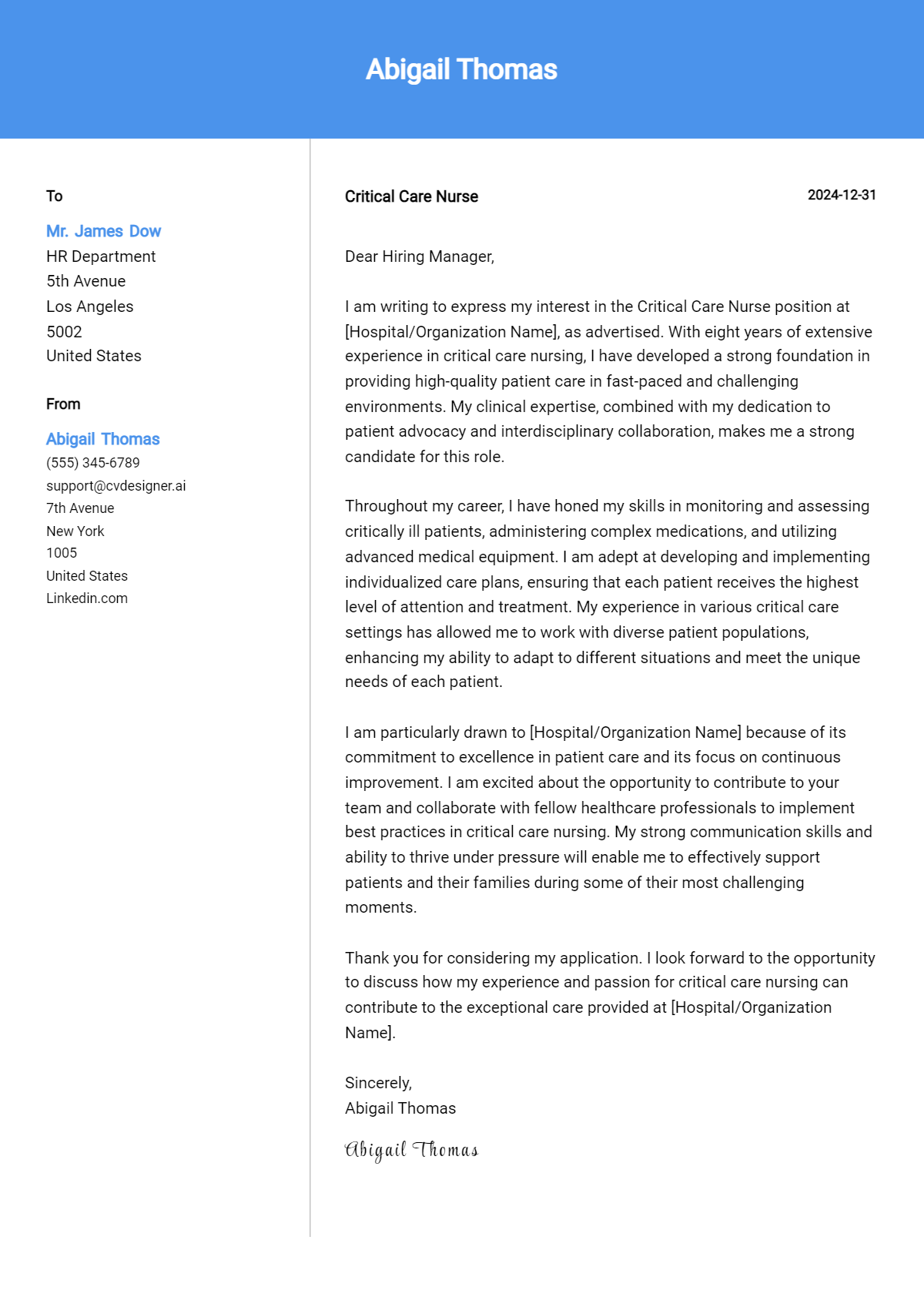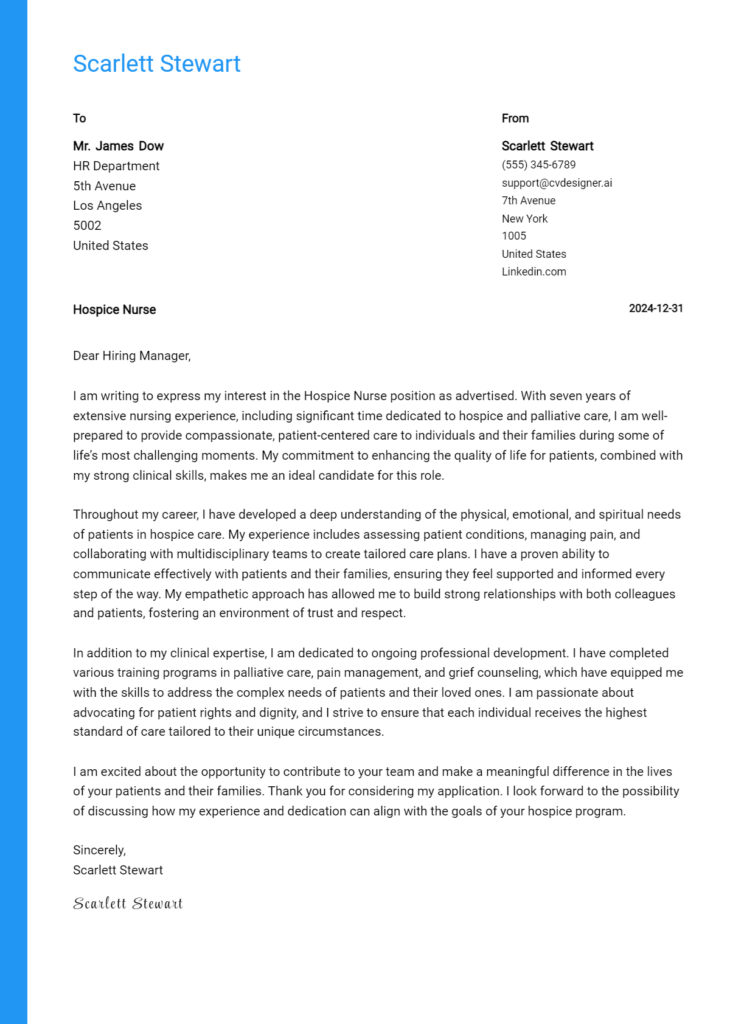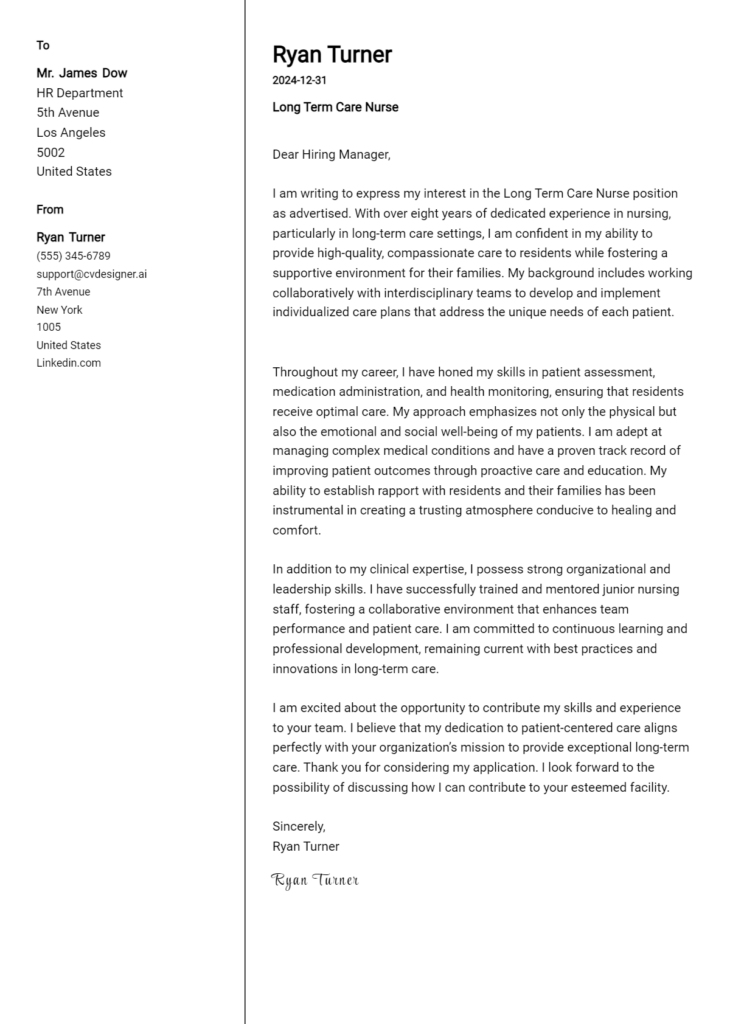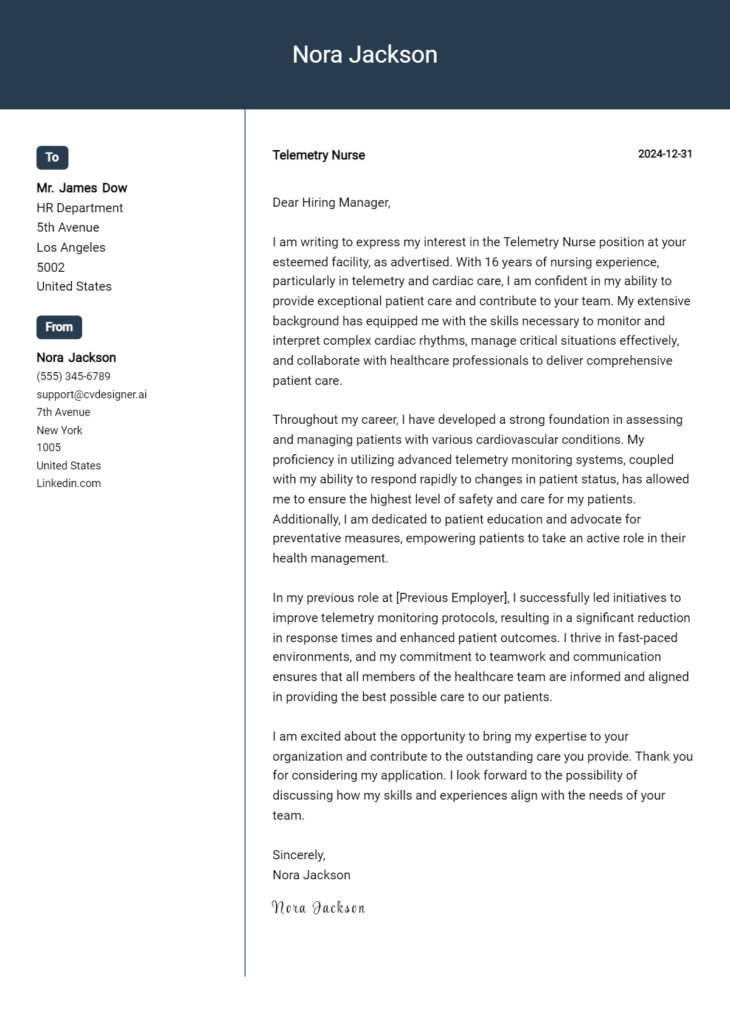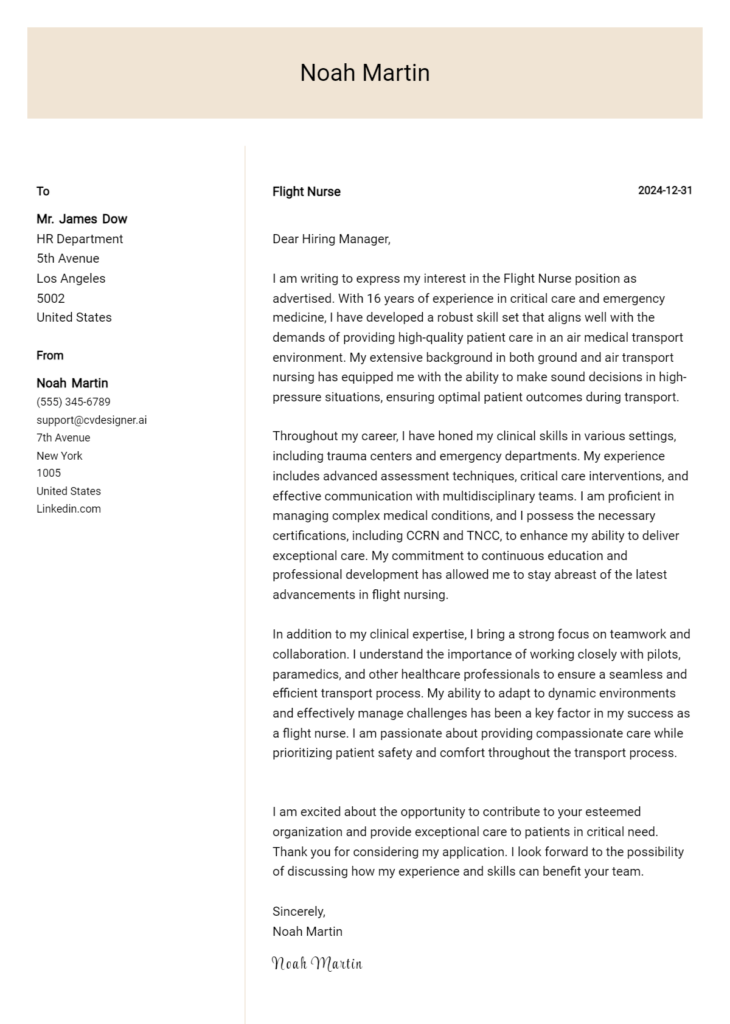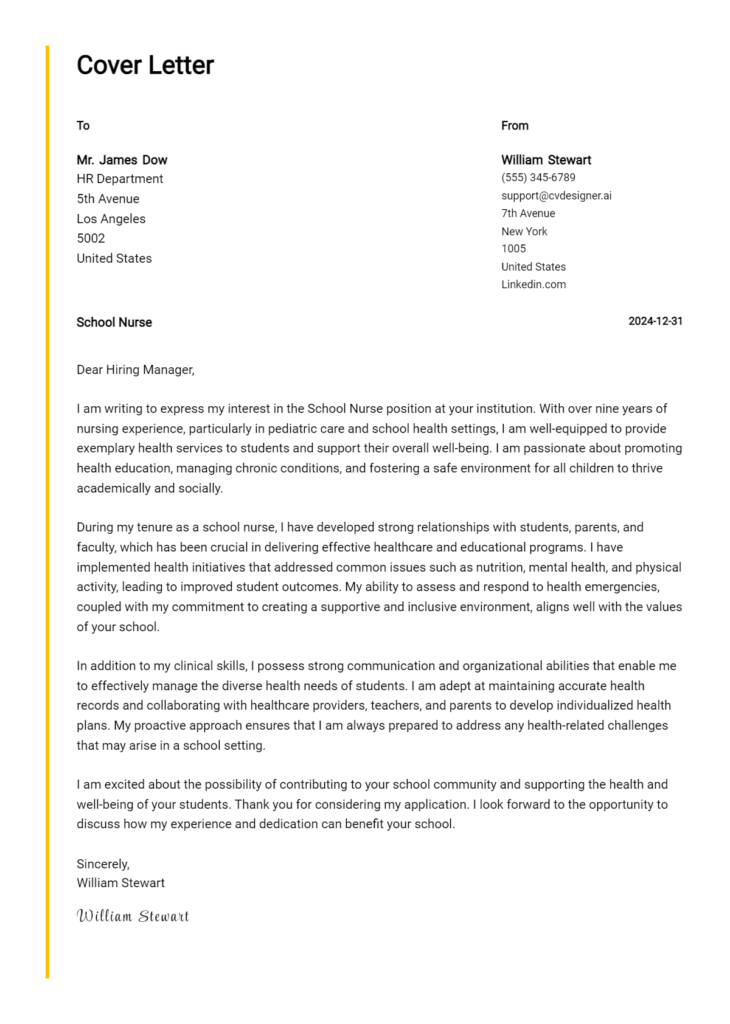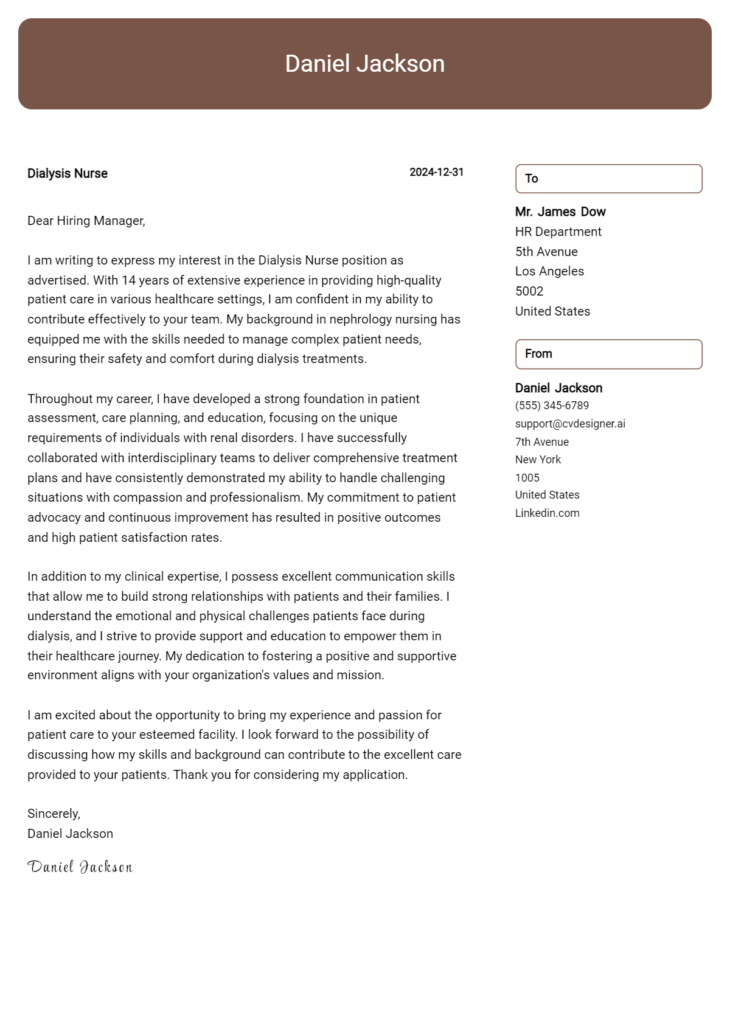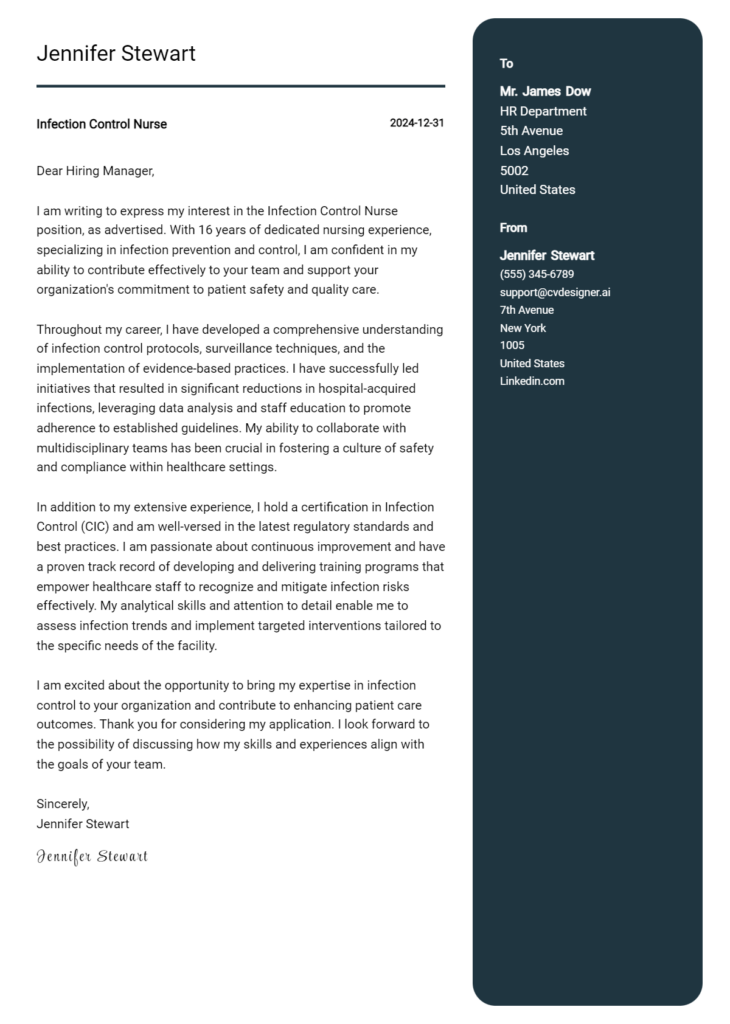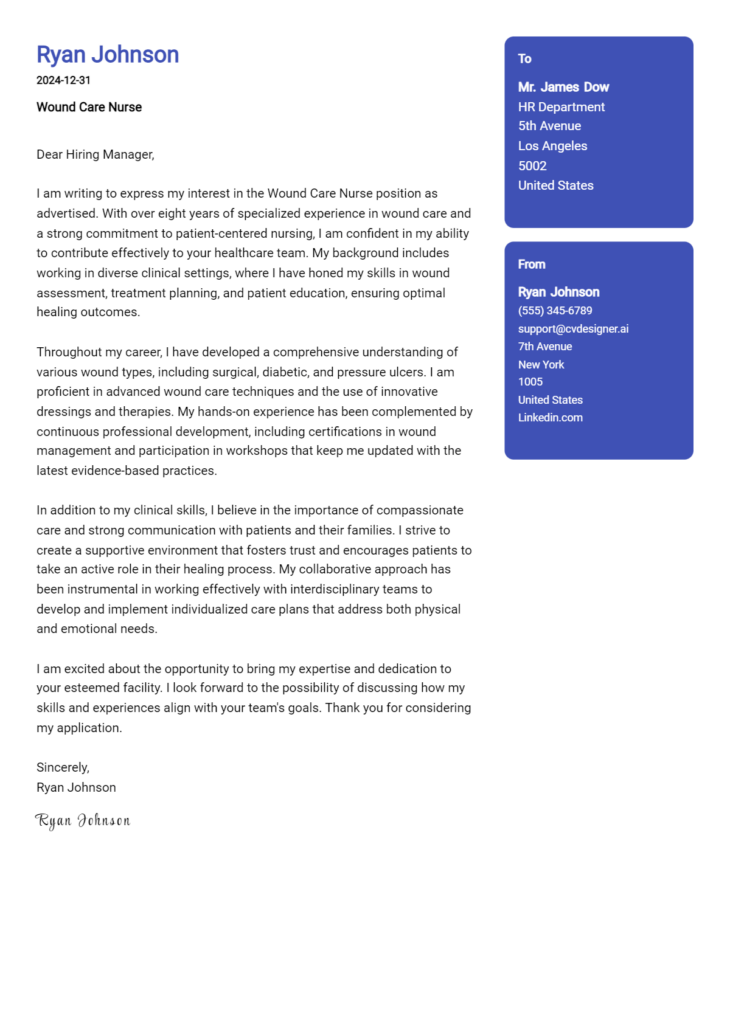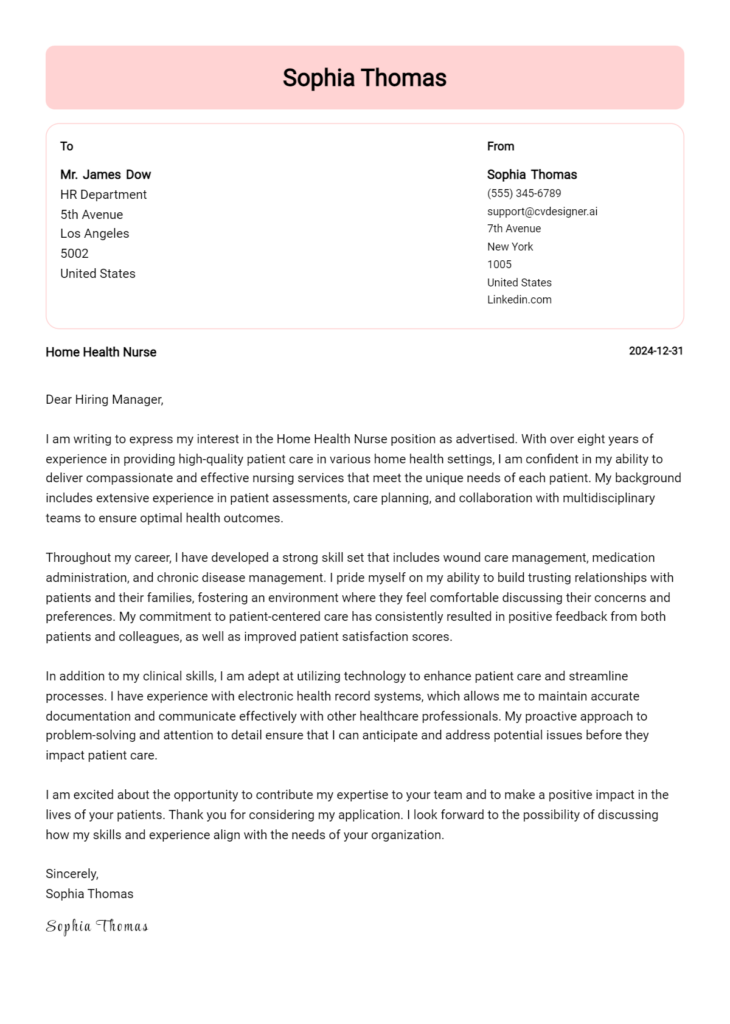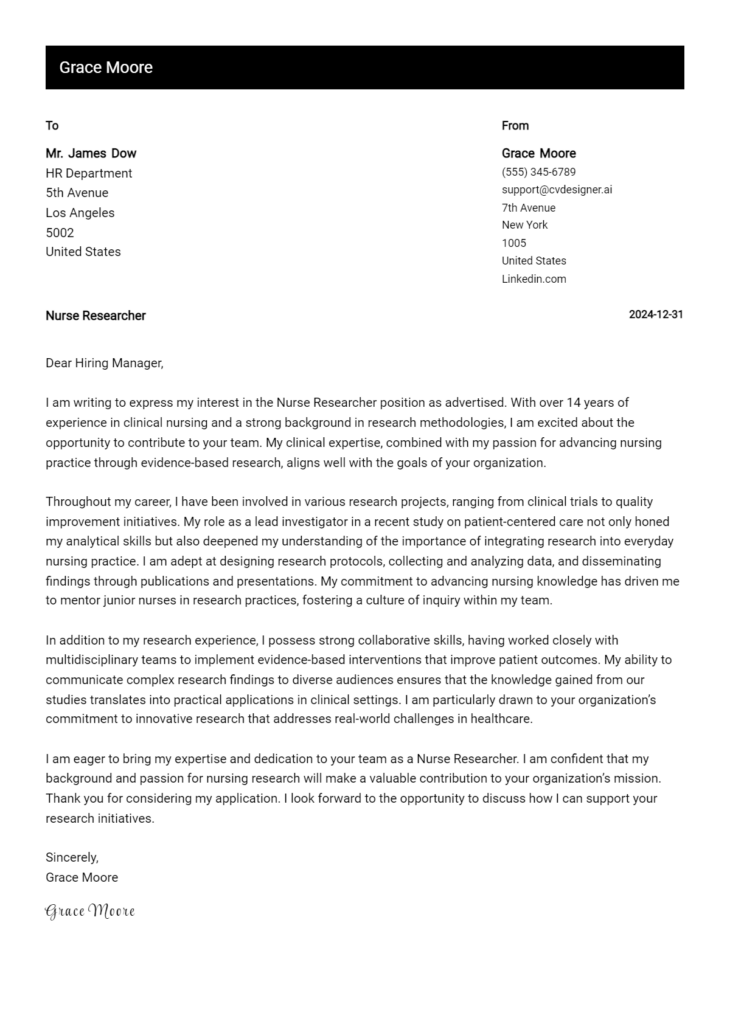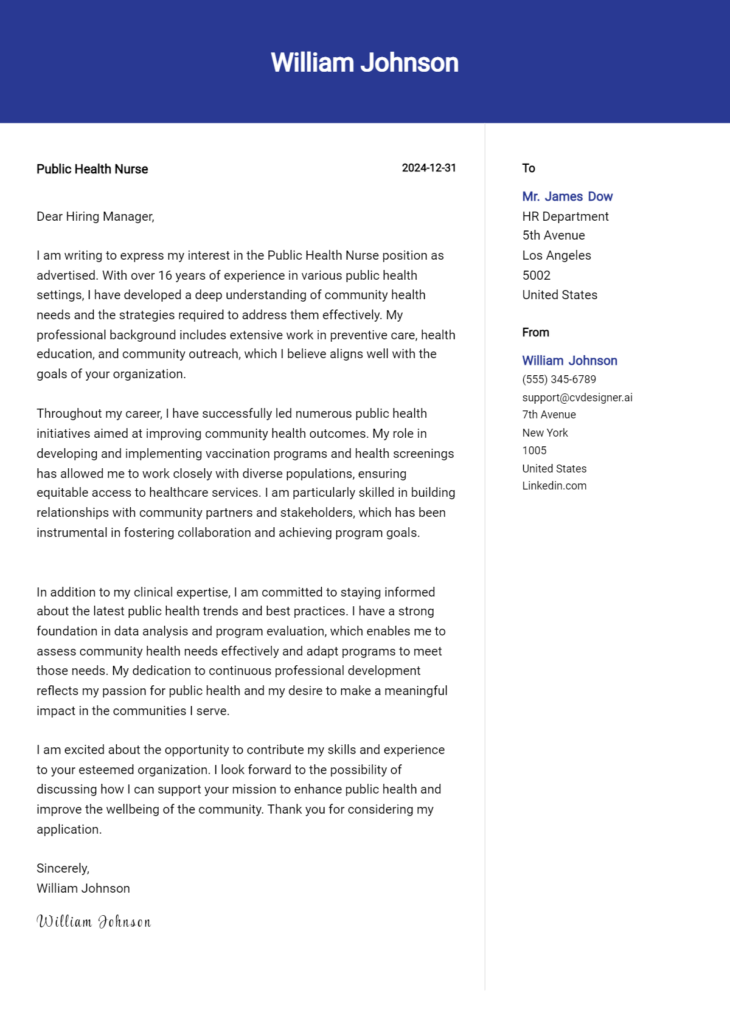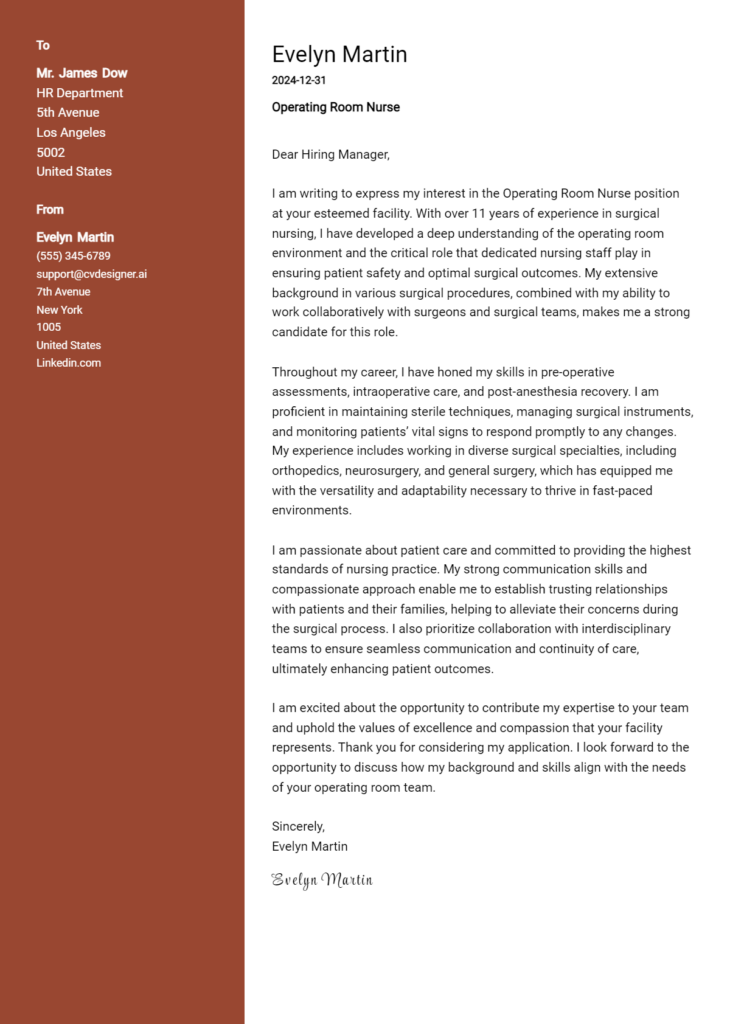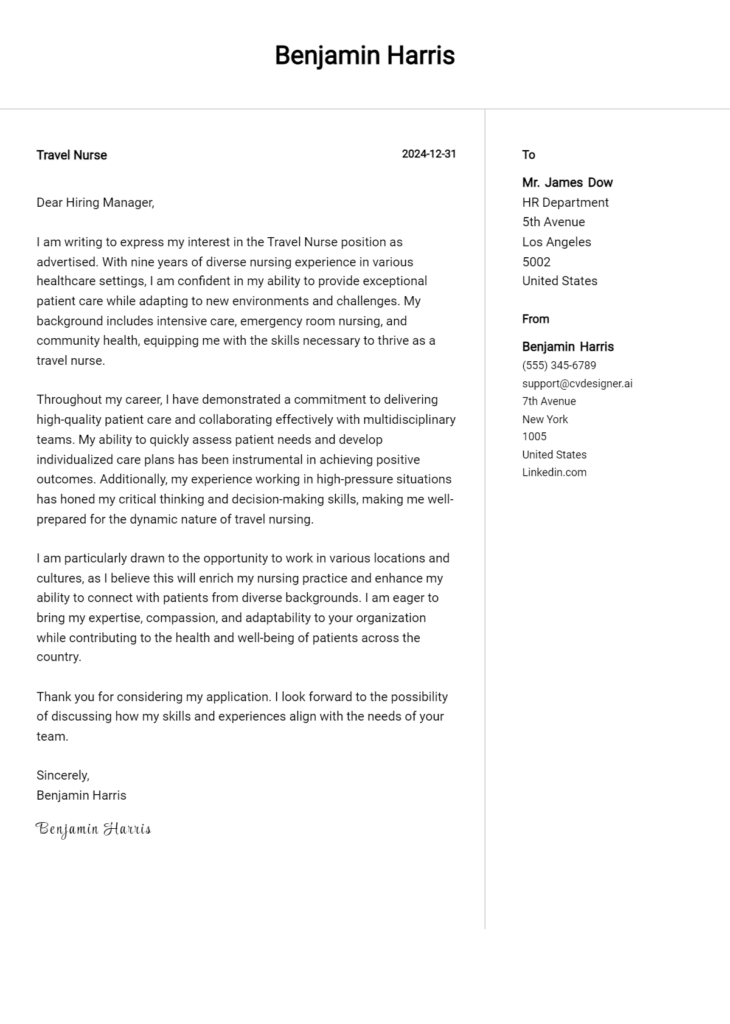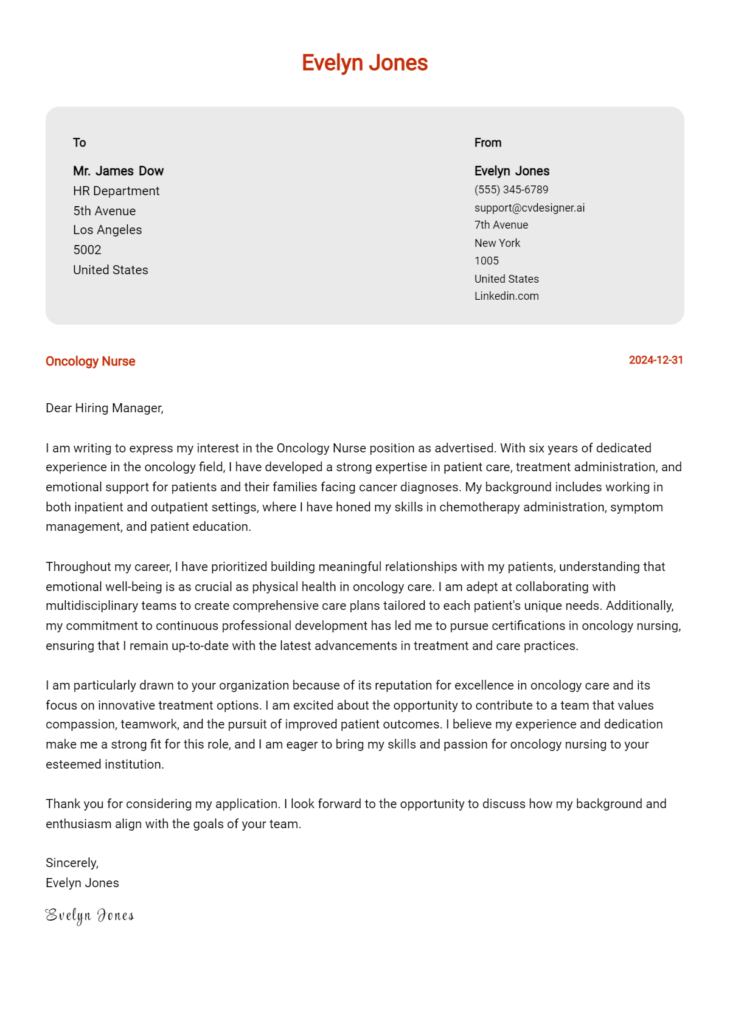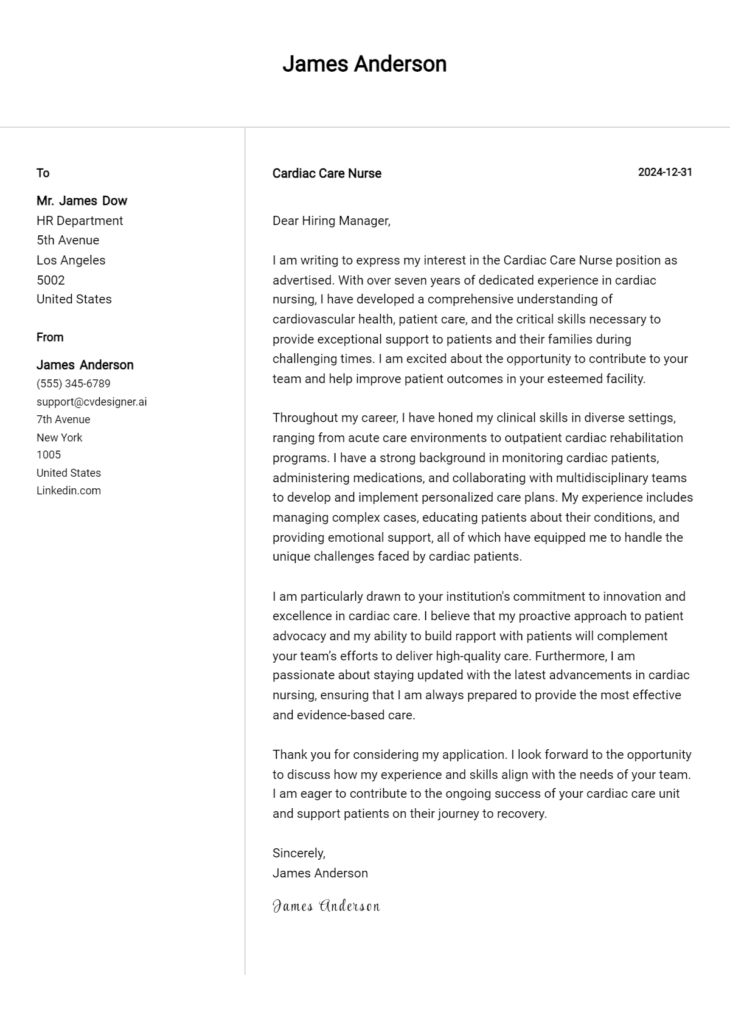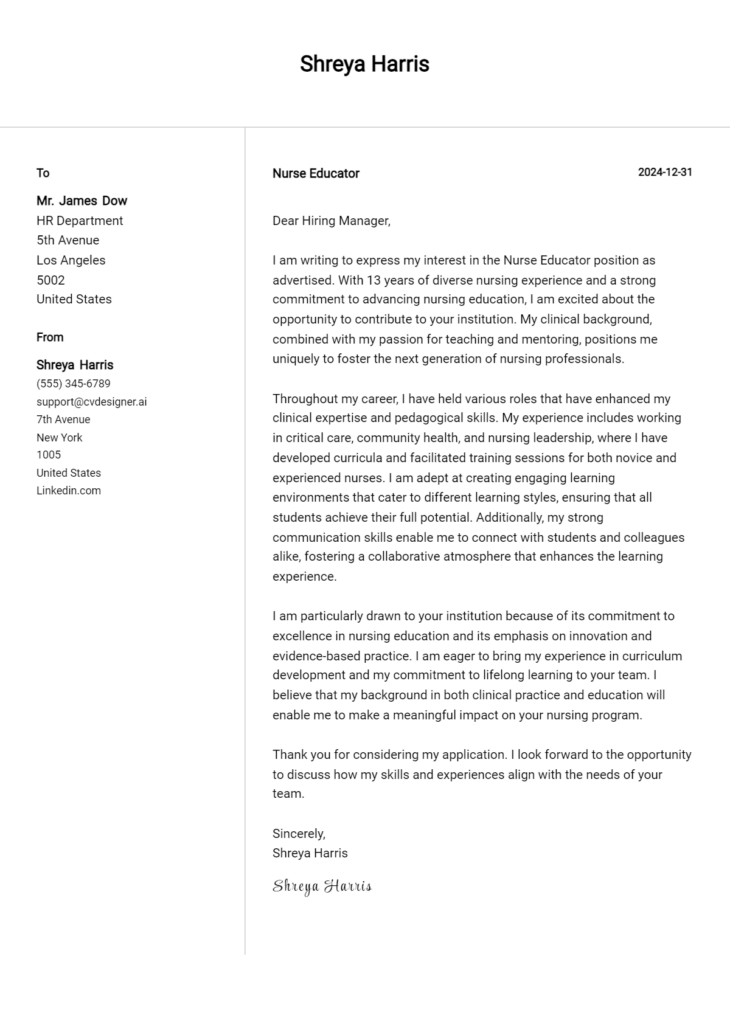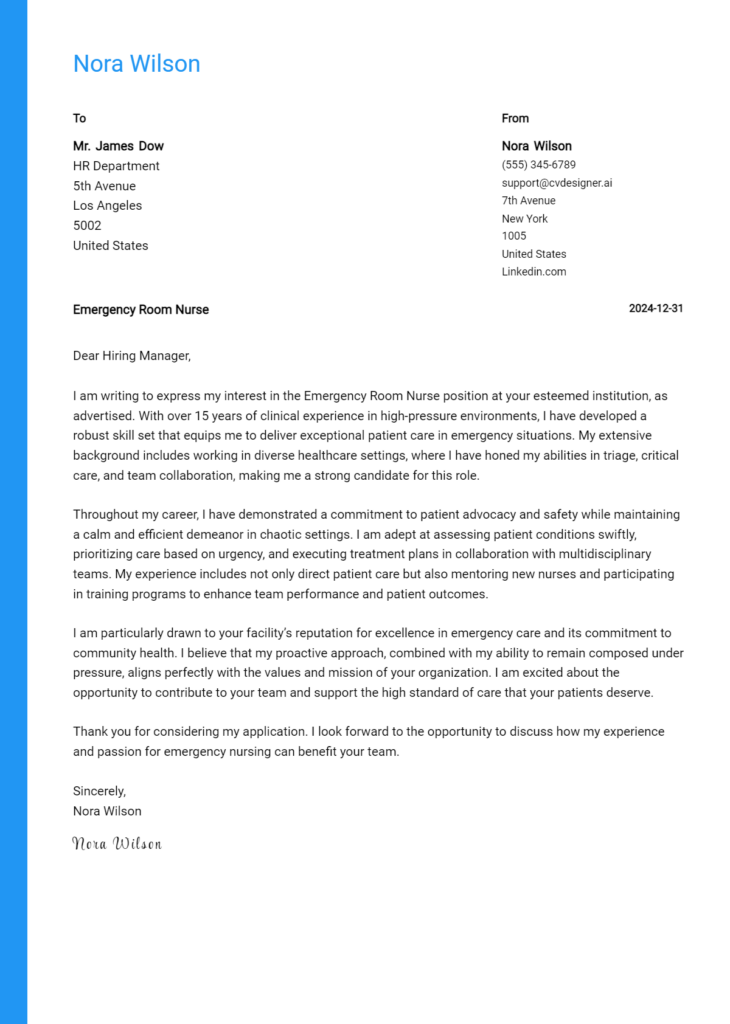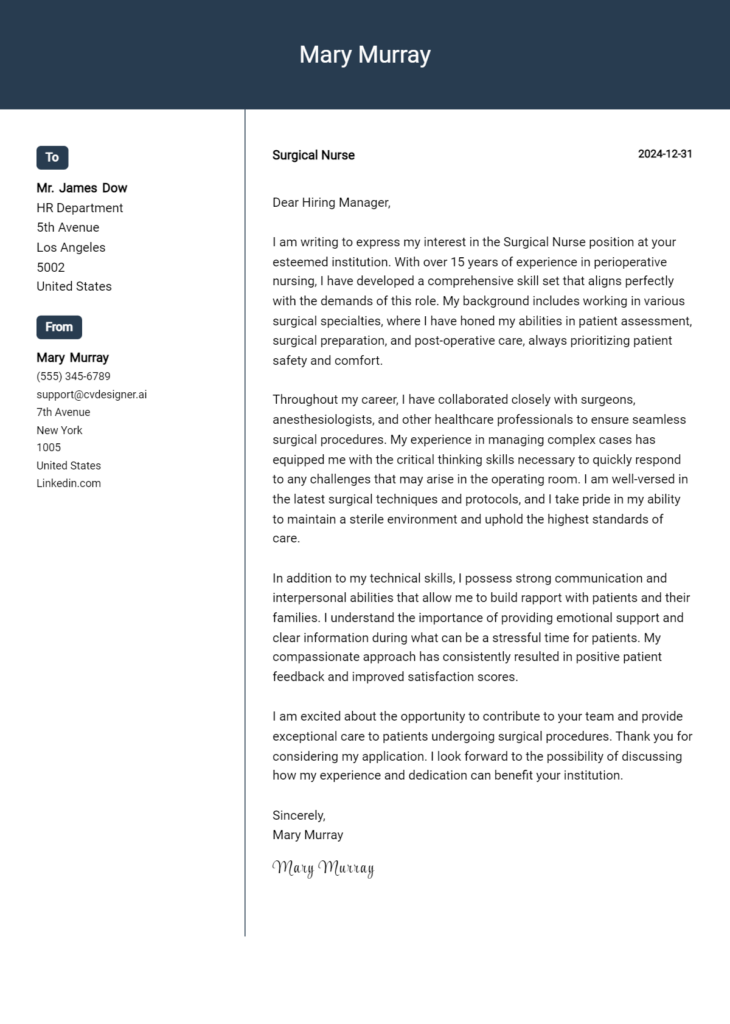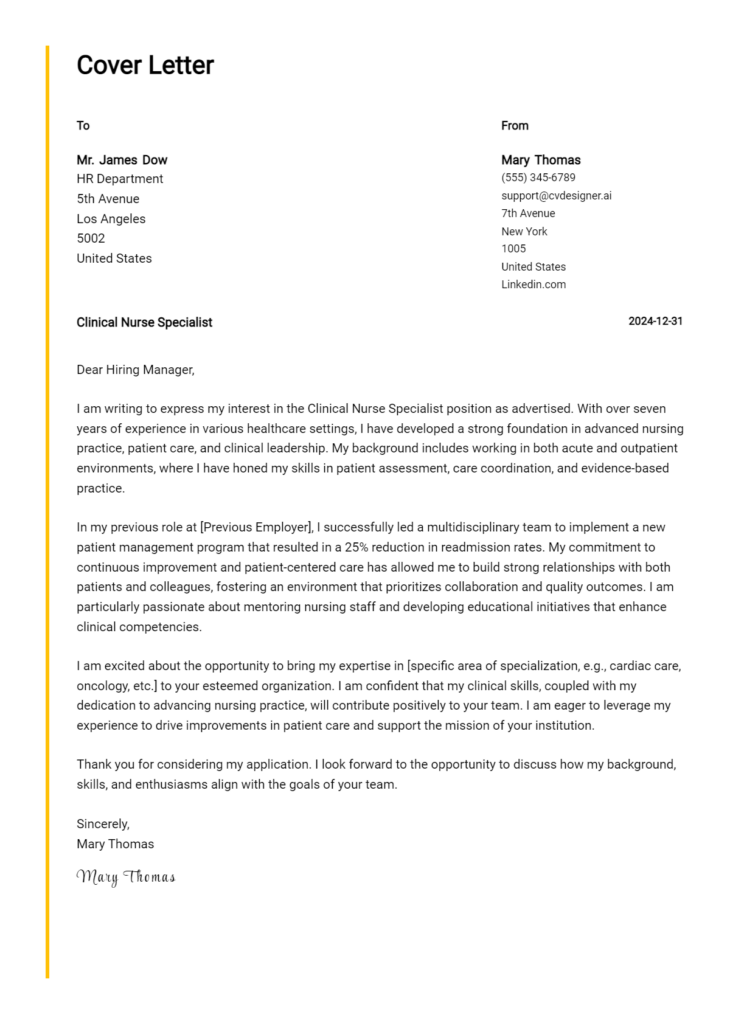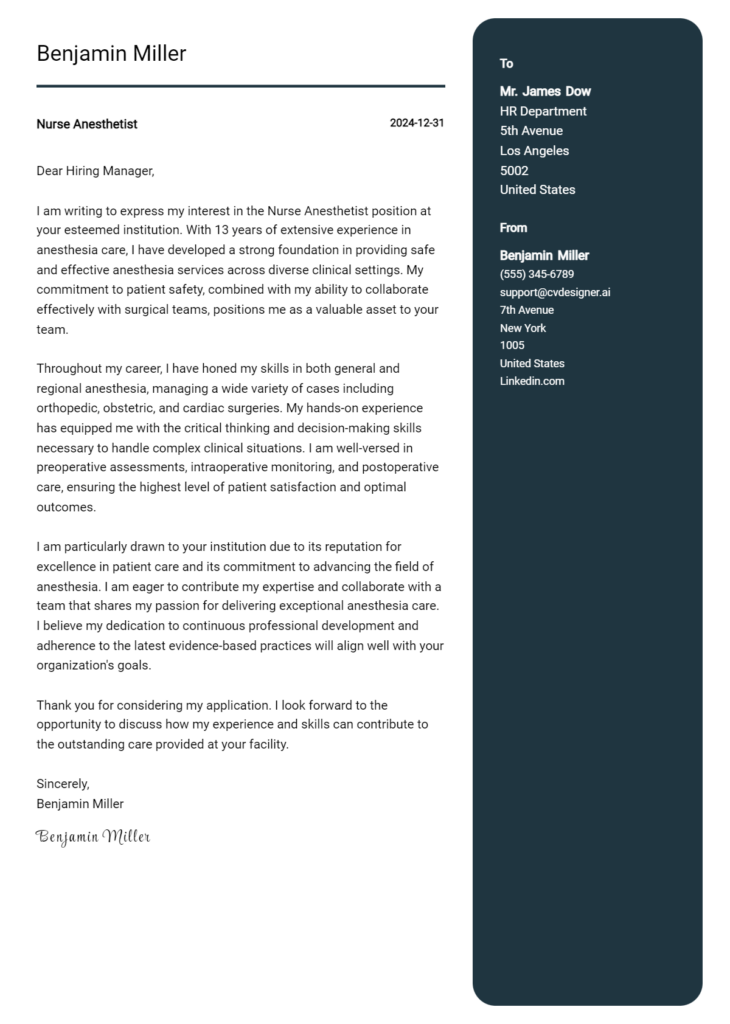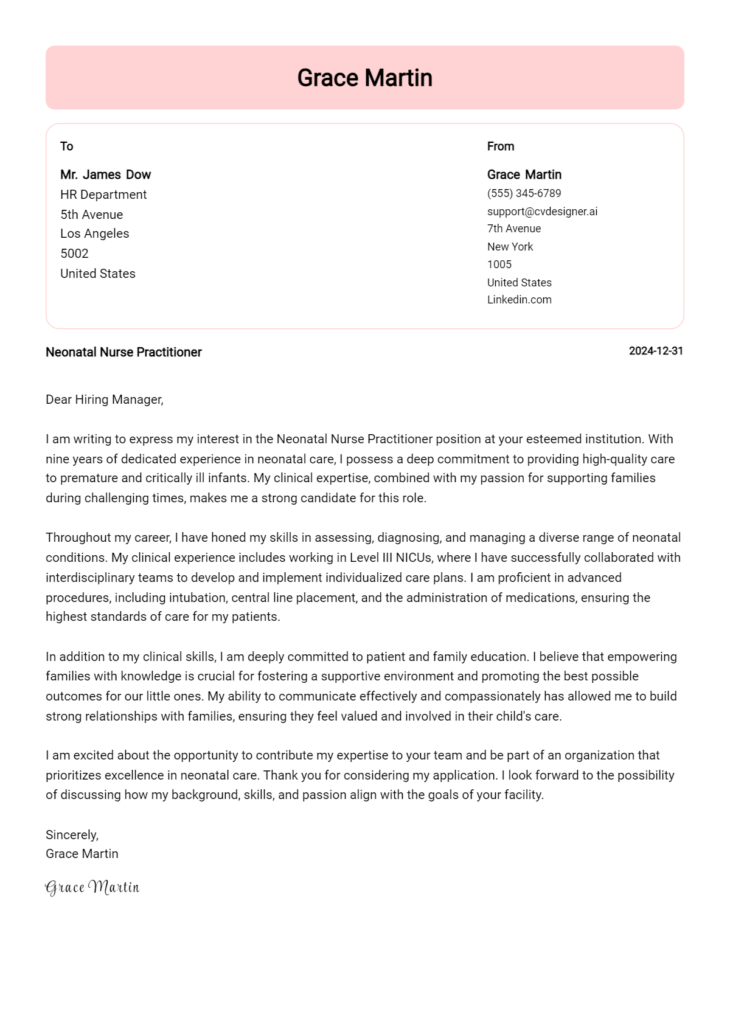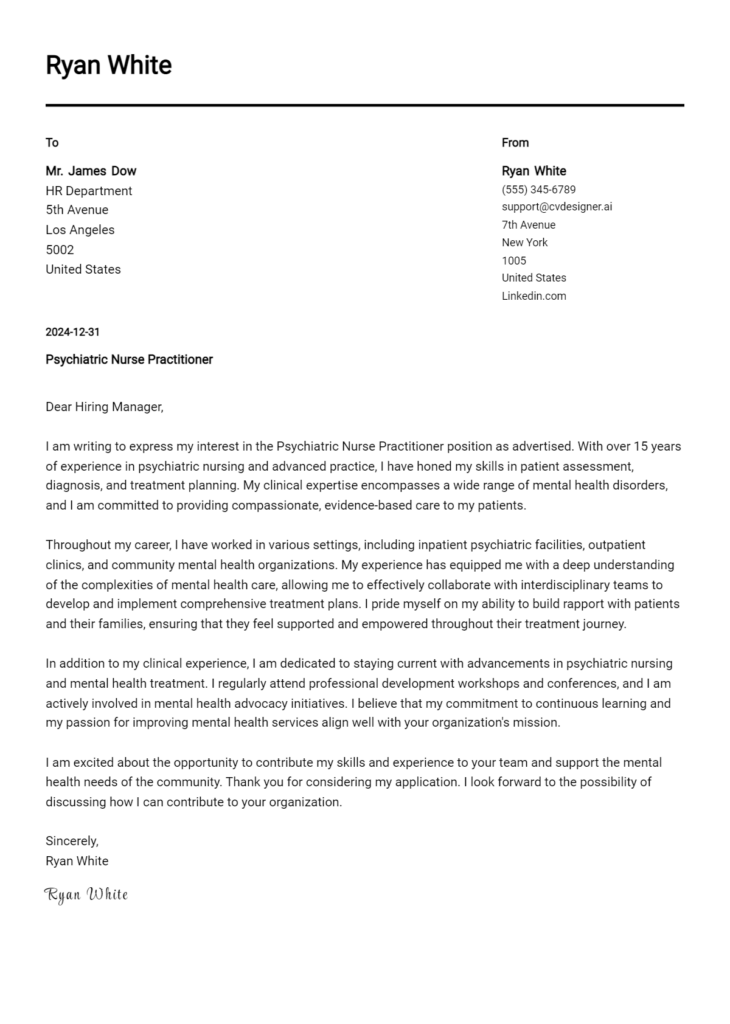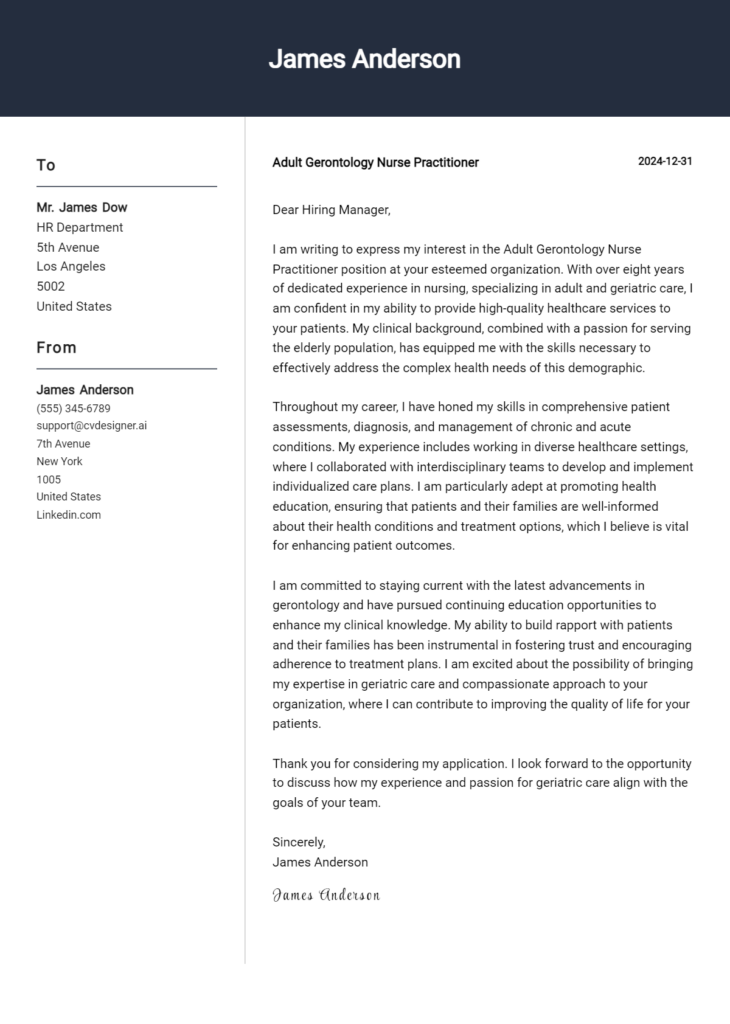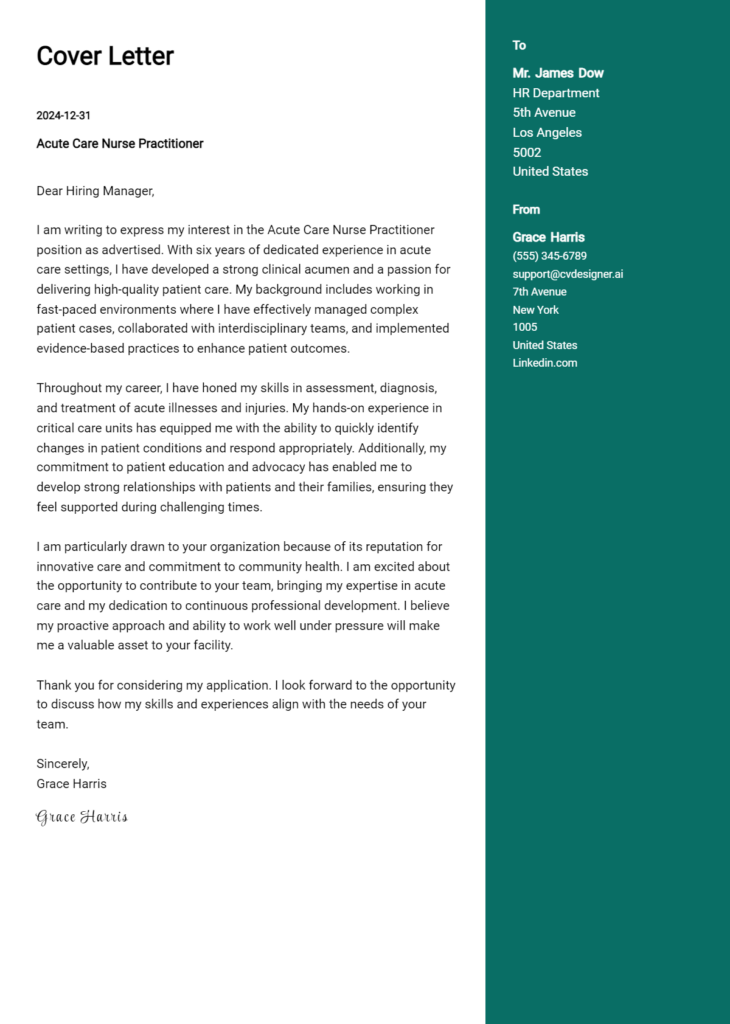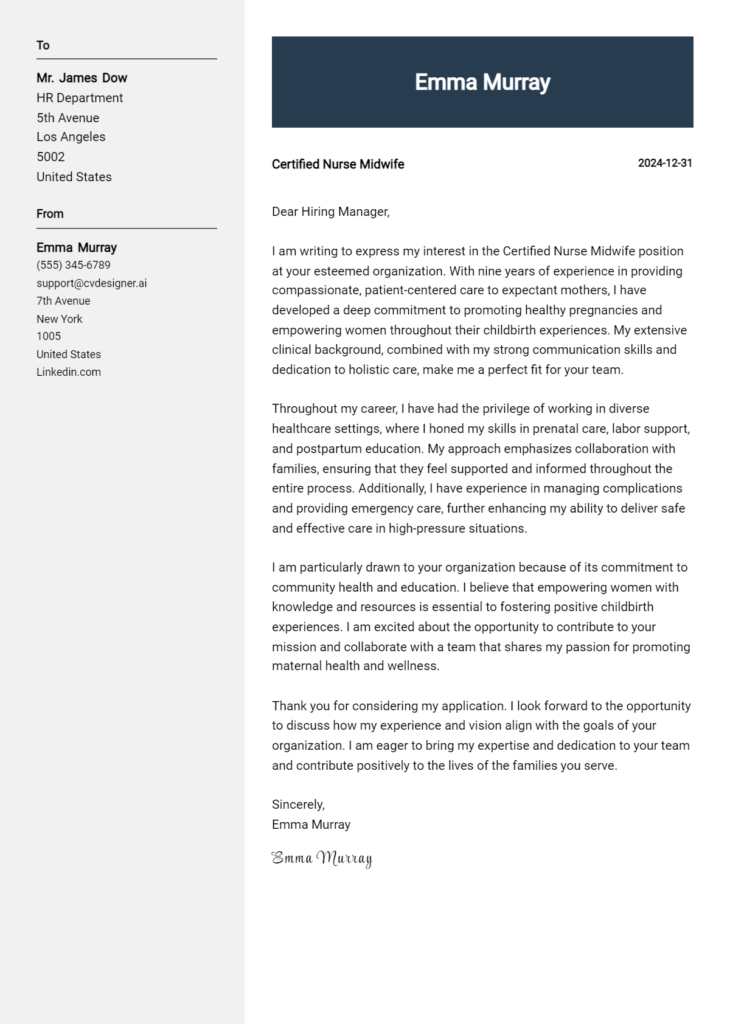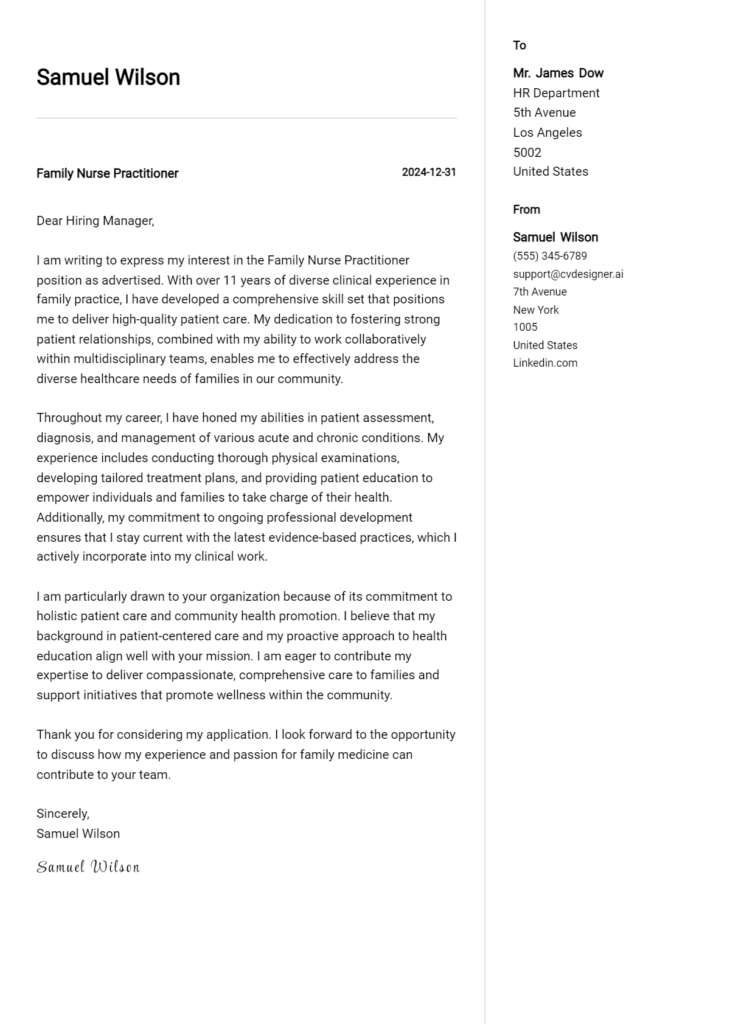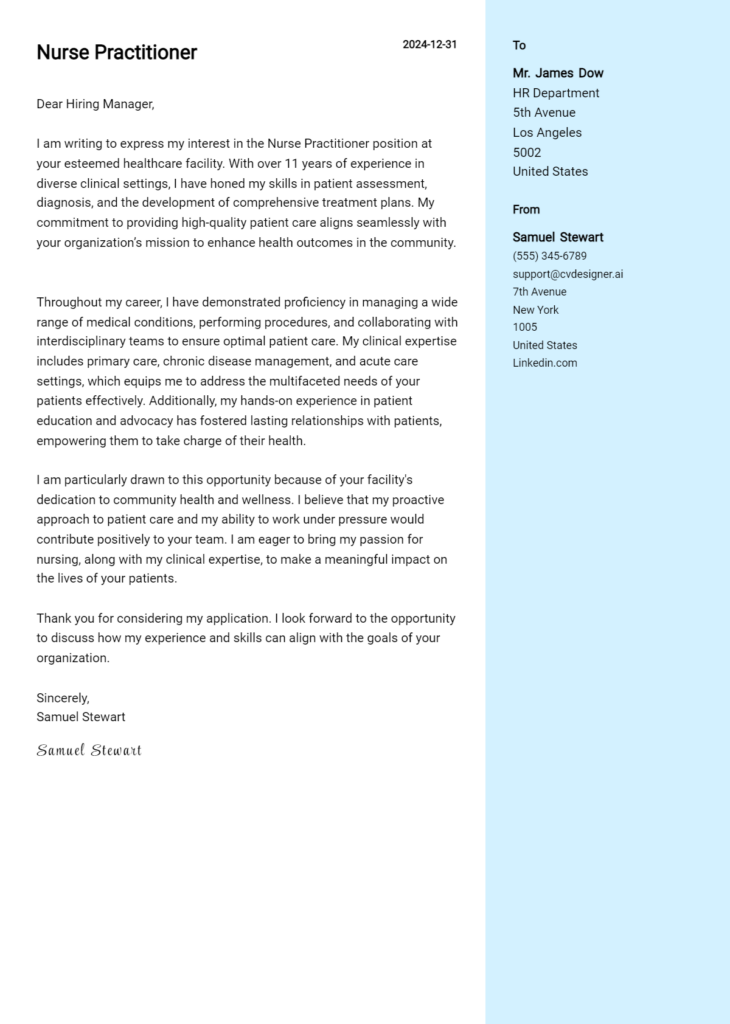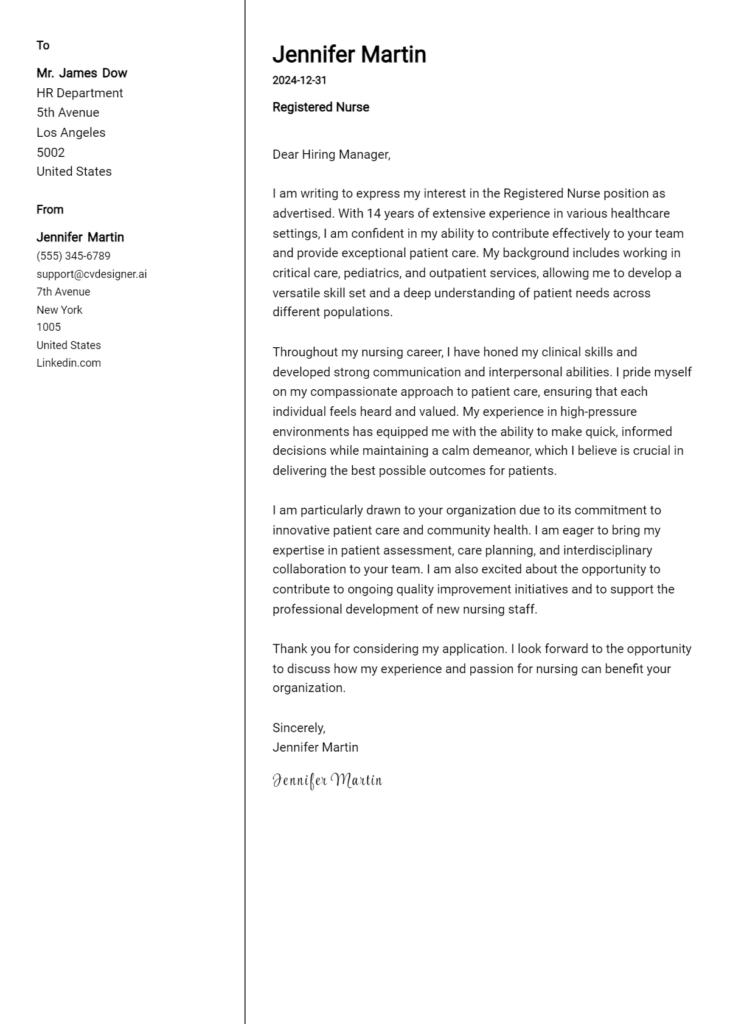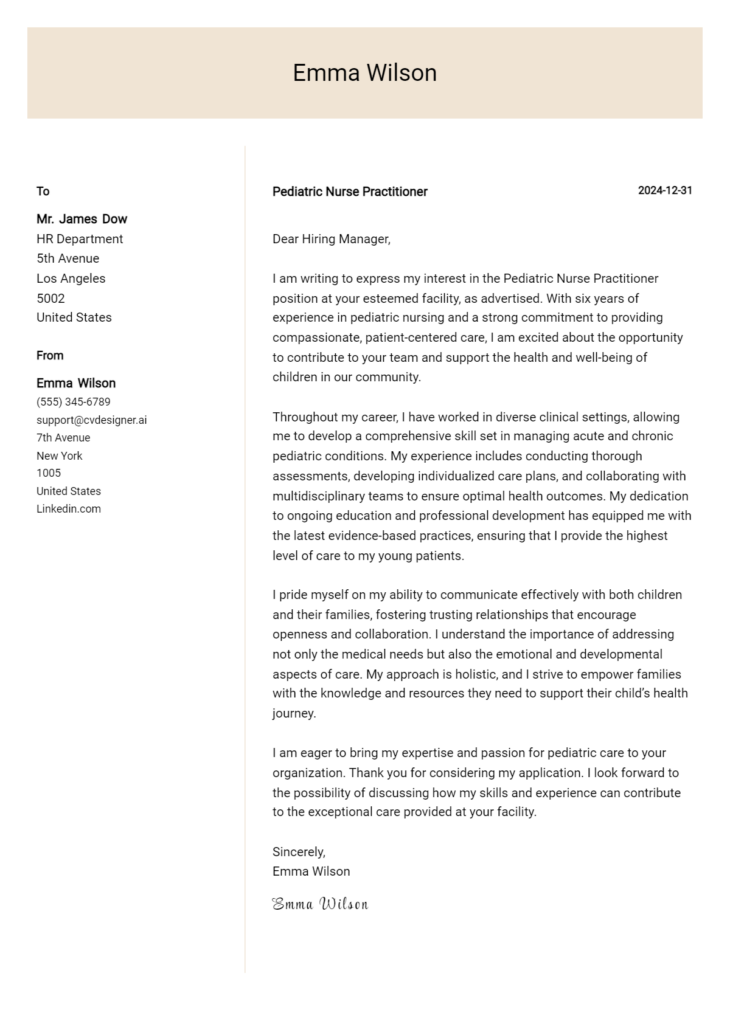Critical Care Nurse Cover Letter Examples
Explore additional Critical Care Nurse cover letter samples and guides and see what works for your level of experience or role.
How to Format a Critical Care Nurse Cover Letter?
Crafting a compelling cover letter is essential for a Critical Care Nurse, as it serves as your first opportunity to convey your passion for patient care and your clinical expertise to a potential employer. Proper formatting not only showcases your professionalism but also reflects your ability to communicate effectively, a crucial skill in the high-pressure environment of critical care. A well-structured cover letter can capture the hiring manager's attention, allowing you to present your qualifications in a clear and organized manner.
In this guide, we'll explore how to effectively format your cover letter, emphasizing the specific requirements and nuances of the nursing profession.
We'll focus on the essential components of a professional cover letter, including:
- Cover Letter Header
- Cover Letter Greeting
- Cover Letter Introduction
- Cover Letter Body
- Cover Letter Closing
Each section is vital for illustrating your qualifications and commitment to excellence in nursing. Let’s delve into each part to help you create a standout cover letter.
Importance of the Cover Letter Header for a Critical Care Nurse
The cover letter header is a crucial component of your application as a Critical Care Nurse, as it sets the tone for professionalism and organization. A well-structured header provides essential information, including your contact details, the date, and the recipient's information, ensuring that your letter is easy to read and navigate. Clarity and professionalism are paramount; a strong header not only conveys your attention to detail but also makes a positive first impression on potential employers.
Here’s what your cover letter header should include:
- Your name and contact information (phone number, email address)
- The date of writing
- The recipient's name, title, and organization
A clear and professional header can make your cover letter stand out in a competitive job market.
Strong Example
John Doe, RN, BSN 1234 Health St. Cityville, ST 12345 (123) 456-7890 johndoe@email.com October 15, 2023 Jane Smith, Hiring Manager Cityville Hospital 5678 Care Ave. Cityville, ST 12345
Weak Example
Hi! I’m applying for the Critical Care Nurse position. 10/15/23 To Whom It May Concern,
Importance of the Cover Letter Greeting
The greeting of a cover letter is crucial as it sets the tone for the entire communication. A well-crafted greeting not only reflects your professionalism but also adds a personal touch by directly addressing the hiring manager. Personalization shows that you have taken the time to research the company and its staff, which can make a positive impression. To create a strong connection, avoid generic greetings like "To Whom It May Concern" and instead strive to find the hiring manager's name through company websites or LinkedIn. This effort demonstrates your genuine interest in the position and the organization.
Strong Greeting Example
Dear Ms. Johnson,
Weak Greeting Example
To Whom It May Concern,
The Importance of a Compelling Cover Letter Introduction for a Critical Care Nurse
A well-crafted cover letter introduction is essential for a Critical Care Nurse, as it sets the tone for the entire application and serves as the first impression for the hiring manager. This introductory paragraph should not only capture attention but also express genuine interest in the role while highlighting key skills or achievements relevant to critical care. A strong introduction can differentiate a candidate from others, demonstrating their passion for nursing and their capability to handle the demands of a high-stakes environment. Conversely, a weak introduction may fail to engage the reader, potentially leading to an overlooked application. Below are examples of strong and weak cover letter introductions to illustrate this point.
Strong Example
As a dedicated Critical Care Nurse with over five years of experience in fast-paced ICU environments, I am excited to apply for the position at [Hospital Name]. My commitment to providing exceptional patient care is demonstrated by my successful management of critical cases, where I consistently collaborate with multidisciplinary teams to ensure optimal outcomes. I am passionate about making a difference in the lives of patients and their families during the most challenging times, and I believe my skills in rapid assessment and advanced life support make me an ideal candidate for this role.
Weak Example
I am writing to apply for the Critical Care Nurse position. I have some experience in nursing, and I think I could do a good job. I am interested in working at your hospital because it seems like a nice place. I hope you consider my application.
Purpose of the Cover Letter Body for a Critical Care Nurse
The cover letter body for a Critical Care Nurse serves to present the candidate's qualifications, experiences, and unique value proposition to potential employers. It is an opportunity to showcase pertinent skills, such as critical thinking, teamwork, and advanced clinical knowledge, while also highlighting specific projects or accomplishments that demonstrate the nurse's ability to thrive in high-pressure environments. By detailing experiences with patient care, collaboration with multidisciplinary teams, and contributions to quality improvement initiatives, the candidate can effectively communicate their potential impact on the organization.
Strong Example
I am excited to apply for the Critical Care Nurse position at XYZ Hospital, where I believe my extensive experience in critical care and passion for patient advocacy will make a significant contribution. During my tenure at ABC Medical Center, I led a quality improvement project that reduced ventilator-associated pneumonia rates by 30%. This initiative not only enhanced patient outcomes but also improved staff training protocols, showcasing my ability to drive positive change in the unit. Additionally, my certification in Advanced Cardiac Life Support and my experience in managing complex cases equip me with the skills necessary to deliver exceptional care in a fast-paced environment. I am eager to bring my expertise and collaborative spirit to your esteemed team.
Weak Example
I am applying for the Critical Care Nurse position. I have worked in a hospital for several years and have some experience with patients. I think I would be a good fit for your team because I care about helping people. I have done some training and have seen many cases in the ICU. I hope to bring my skills to your hospital and do my best.
Importance of the Cover Letter Closing for a Critical Care Nurse
The closing paragraph of a cover letter is crucial as it provides an opportunity to summarize your qualifications, reiterate your enthusiasm for the position, and encourage the hiring manager to take the next steps. A strong closing leaves a lasting impression, reinforcing your suitability for the role and prompting the reader to review your resume or schedule an interview. Conversely, a weak closing may come across as indifferent or unprofessional, potentially diminishing your chances of moving forward in the hiring process.
Strong Example
Thank you for considering my application for the Critical Care Nurse position at [Hospital Name]. With over five years of experience in intensive care settings, coupled with my dedication to patient-centered care, I am excited about the opportunity to contribute to your team. I look forward to the possibility of discussing how my skills and passion align with the goals of your department. Please feel free to contact me to schedule an interview, as I am eager to share more about my experience and how I can make a positive impact at [Hospital Name].
Weak Example
Thanks for reading my letter. I hope you consider my application. I’m not sure when I can meet, but I’ll be around if you want to talk. I guess that’s it for now.
These tips will help candidates craft an effective cover letter for a Critical Care Nurse position. A well-written cover letter is crucial in highlighting your technical skills, problem-solving abilities, knowledge of the Software Development Life Cycle (SDLC), teamwork capabilities, and a commitment to continuous learning. By effectively demonstrating these qualities, you can make a strong case for your candidacy and stand out in a competitive job market. Here are five detailed tips to guide you in writing your cover letter.
Tips for Crafting an Effective Cover Letter for a Critical Care Nurse
Showcase Your Technical Skills
As a Critical Care Nurse, your technical expertise is essential. Highlight specific skills such as proficiency in advanced medical equipment, electronic health records (EHR) systems, and monitoring technologies. Use concrete examples from your experience to illustrate how you have effectively employed these skills in high-pressure situations, ensuring optimal patient care.Emphasize Problem-Solving Abilities
Critical care nursing often involves making quick decisions during emergencies. Share instances where you faced challenging scenarios and how your analytical thinking and problem-solving skills led to successful outcomes. Discuss your approach to prioritizing patient needs and collaborating with multidisciplinary teams to develop effective care plans.Demonstrate Knowledge of SDLC
Understanding the Software Development Life Cycle can enhance your ability to work with healthcare technologies. If applicable, mention any experience you have with implementing or improving healthcare software systems, patient portals, or data management tools. This demonstrates your ability to adapt to the evolving tech landscape in healthcare settings.Highlight Teamwork and Collaboration
Critical care relies heavily on teamwork. Your cover letter should reflect your ability to work harmoniously with doctors, fellow nurses, and other healthcare professionals. Provide examples of how you contributed to team-based care initiatives, participated in interdisciplinary rounds, or led efforts to improve communication within your unit.Express a Passion for Continuous Learning
The field of critical care is always evolving, and a commitment to lifelong learning is vital. Share your experiences with ongoing education, such as certifications, workshops, or advanced training. This not only shows your dedication to professional growth but also assures employers that you are equipped to stay current with best practices in critical care.
Creating a compelling cover letter is easier with the right resources. Consider utilizing cover letter templates and a cover letter builder to streamline the writing process and ensure your letter stands out.
Common Mistakes to Avoid in a Critical Care Nurse Cover Letter
Crafting a compelling cover letter is essential for making a strong impression as a Critical Care Nurse. Avoiding common pitfalls can significantly enhance your chances of landing an interview. Here are some frequent mistakes to steer clear of, along with tips on how to avoid them:
Generic Greetings: Using a vague salutation like "To Whom It May Concern" can make your cover letter feel impersonal. Research the hiring manager’s name and address them directly.
Lack of Specificity: Failing to tailor your cover letter to the specific job can lead to missed opportunities. Reference the job description and highlight relevant skills or experiences that match.
Overly Lengthy Content: A cover letter should be concise; aim for a single page. Focus on key achievements and skills that demonstrate your qualifications without overwhelming the reader.
Neglecting Formatting: Poor formatting can detract from your professionalism. Follow a clear cover letter format to ensure readability and organization—check out our guide on cover letter format.
Repetition of Your Resume: Your cover letter should complement your resume, not repeat it. Use this opportunity to elaborate on specific experiences or to tell a story that showcases your passion for critical care nursing.
Typos and Grammatical Errors: Mistakes in spelling or grammar can undermine your credibility. Proofread your letter multiple times and consider having someone else review it for clarity.
Failing to Demonstrate Enthusiasm: A lack of enthusiasm can make your application blend in with others. Convey your passion for providing exceptional patient care and your commitment to the nursing profession.
By avoiding these common mistakes and utilizing effective strategies, you can create a standout cover letter that highlights your qualifications for the role. For inspiration, explore our cover letter examples to see how to effectively present your skills and experiences.
Cover Letter FAQs for Critical Care Nurse
What should I include in my cover letter as a Critical Care Nurse?
In your cover letter, highlight your relevant nursing qualifications, specifically your critical care experience. Start with your nursing education and any certifications, such as CCRN or BLS/ACLS. Discuss your hands-on experience in high-acuity settings, showcasing your skills in patient assessment, emergency response, and teamwork. Include specific examples of patient care situations where you made a significant impact. Emphasize your ability to work under pressure, manage complex cases, and communicate effectively with multidisciplinary teams. Finally, express your passion for critical care nursing and your dedication to providing high-quality patient care.
How can I tailor my cover letter for a specific job?
To tailor your cover letter, research the healthcare facility and the specific critical care position you’re applying for. Identify keywords from the job description and incorporate them into your letter. Mention the facility's mission or values and how they align with your professional beliefs. If the job emphasizes teamwork, include examples of successful collaboration in your past roles. Additionally, address specific skills or experiences that match the needs of the role, such as familiarity with advanced monitoring technologies or particular patient populations. Customizing your cover letter shows your genuine interest and helps you stand out.
How long should my cover letter be?
Your cover letter should ideally be one page long, typically consisting of three to four paragraphs. Keep it concise while ensuring you provide enough detail to illustrate your qualifications and experiences. Aim for a length of about 250 to 400 words. Employers appreciate clarity and brevity, so focus on the most relevant points that demonstrate your skills and fit for the critical care role. Use clear, professional language and avoid overly technical terms that might confuse the reader. A well-structured and succinct cover letter will make a stronger impression.
Should I include my nursing license information in my cover letter?
Yes, including your nursing license information in your cover letter is a good practice, especially for a critical care nursing position. Mention your RN license number and the state(s) where you are licensed, as this assures the employer of your credentials. You can include this information in your introductory paragraph or a closing statement. Additionally, if you have any advanced certifications, such as CCRN or specialized training, be sure to highlight them as well. This gives employers confidence in your qualifications and readiness to take on the responsibilities of a critical care nurse.
Build your Cover Letter in minutes
Use an AI-powered cover letter builder and have your letter done in 5 minutes. Just select your template and our software will guide you through the process.

